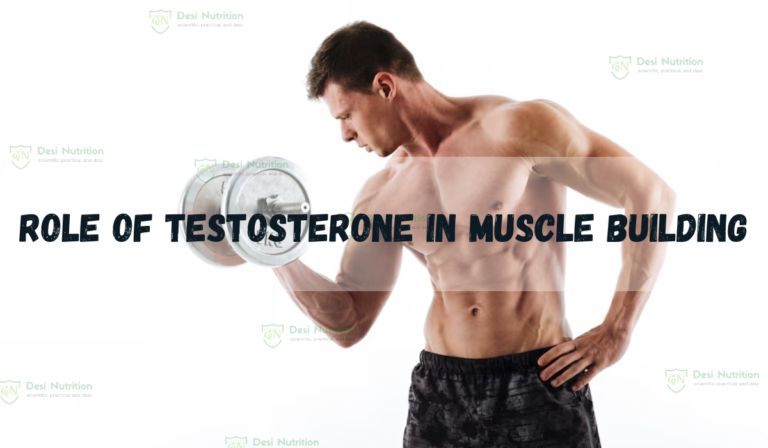Testosteron is the male hormone that plays a crucial role in muscle building. That is the reason why some females take time to build muscles rather than men who can achieve this goal sooner. The level of testosterone plays a major role in muscle gain. In this article we will understand the role of testosterone in muscle building.
Testosterone has its role in muscle growth, fat distribution, bone density and overall physical strength. Though both the genders, male and female produce testosterone but the level differs in both of them. Men have significantly higher levels of testosterone and when it comes to muscle building this hormone is the key player.
Let’s start from the beginning and understand what testosterone is.
What Is Testosterone?

Testosterone is the main hormone responsible for secondary sexual characteristics in men. Deeper voice, facial and body hair, and increased muscle mass and bone density are the results of testosterone in men.
The hormone testosterone is produced in the testes in men and in smaller amounts in the ovaries and adrenal glands in women in lower quantities. It is an androgenic hormone which is also responsible for muscle strength, muscle mass and sexual health of women.
Testosterone is involved in the process of muscle protein synthesis which is responsible for muscle repair and growth.
So how does testosterone work in building muscle, you ask? Well, the hormone operates by binding to androgen receptors in cells which are then activated to initiate the process of protein synthesis.
How Testosterone Influences Muscle Building

Testosterone has profound effects on the development of lean muscles and that is the reason why it is considered to be the major player in the muscle building process.
Now, let us understand how testosterone impacts muscle building.
Increases Muscle Protein Synthesis
Testosterone aids in muscle building by enhancing muscle protein synthesis which is the process of converting dietary protein into new muscle tissue. High levels of testosterone means an increased ability of the body to synthesize protein to build new muscle; hence giving effective results sooner than expected (considering other factors as well).
Muscle tissues repair themselves after exercising when they undergo microscopic tears and damage which is then repaired when your body is at rest. Testosterone play the significant role of sending signals to the cells to produce more muscle protein.
Increases Muscle Mass and Strength
Testosterone is associated with muscle strength and muscle mass because they help in the muscle building process by increasing the number of satellite cells. Satellite cells are the ones that assist in muscle repair and regeneration. It also helps to increase the size of muscle fibers, specifically type II muscle fibers which are the fat-twitch fibers. These fibers are associated with strength and power.
The presence of this anabolic hormone testosterone is considered important because it promotes tissue growth and muscle hypertrophy. Higher levels of testosterone helps in increasing the size of muscles hence giving you effective results.
Reduces Muscle Protein Breakdown
Testosterone not only promotes protein synthesis but also helps to reduce muscle breakdown. The process of muscle breakdown also known as catabolism in which muscle tissues break down into amino acids. Testosterones help to reduce this process by decreasing the rate at which muscle proteins are broken down. This is how testosterone helps to maintain the muscle mass that you’ve already built. This effect ensures that your efforts for muscle building are not disrupted because of muscle breakdown and it does not lead to muscle loss.
Muscle breakdown and muscle building would be a simultaneous process but the balance between both determines your net muscle gain. This is where testosterone comes into play where it tilts the balance in favor of growth instead of breakdown.
Enhances Recovery
Testosterone helps in the recovery process as well which is the most crucial aspect of muscle building. Recovery is the stage that actually helps in building muscles. It is the time when your muscle fibers grow; hence increasing the size and strength of your muscles. Testosterones helps in recovery by speeding up the process as it reduces muscle damage and inflammation after intense workouts. It also supports the recovery of tendons and ligaments which are often damaged during workouts and are essential parts of muscle.
Focus on improving your recovery time so your body can have an adequate amount of time to recover and with the presence of testosterone you will be able to train more frequently and with greater intensity. But keep in mind to prioritize your recovery days. In fact, the more you will prioritize recovery the better results you will be able to see. Recovery also helps to reduce the risk of overtraining and injury which could be the major hindrances in the process of muscle building.
Increases Bone Density
Testosterones also help to enhance bone density reducing the risk of fractures. Moreover, you need strong bones to support increased muscle mass. While building muscles you have to lift heavy weights and do resistance training for which you need strong bones and the good part is, testosterones are there to help you. They help to increase bone density which not only supports muscle growth but also reduces the risk of bone related injuries and fractures that could hinder your muscle growth journey.
Improves Fat Distribution
Testosterone also supports fat distribution. It regulates your body composition by increasing muscle mass and reducing fat mass. The anabolic hormones improve the utilization of fat as an energy source and prevent excess fat accumulation. Testosterone contributes to better athletic performance and improved physical appearance by promoting leaner body composition.
So how does this hormone work in fat distribution? Well, testosterone increases the number of fat burning beta-adrenergic receptors on fat cells. These then accelerate the breakdown of stored fat into energy. This process helps to gain muscle by minimizing fat gain.
Factors That Affect Testosterone Levels

Testosterone levels do not remain constant throughout your life. There are several factors that influence your testosterone levels which impact the ability to build and maintain muscles. Here is a list of factors that influence the testosterone levels in your body:
Age:
With age your testosterone levels will decline. The levels peak during your late adolescent and early adulthood years between 18-25 years of age. After the age of 30 you will experience a decline in your testosterone levels which is normal.
The decline is about 1-2% per year which will eventually reduce muscle mass, strength and recovery ability. The older you get the more challenging it will be to build muscles.
Diet:
Diet plays a crucial role in your fitness and in achieving your health goals, be it fat loss or muscle building. Your dietary approach is so important in your fitness journey because it helps to regulate your hormones along with other aspects of your body. It also influences your testosterone levels.
For testosterone production your body needs certain nutrients, mainly, zinc, magnesium and vitamin D. A balanced diet rich in both macro and micronutrients is your key to maintain testosterone levels in your peak years.
Ensure to consume a diet rich in healthy fats, especially monounsaturated and saturated fats which supports testosterone synthesis. Keep your diet low on processed foods because it can have a negative affect on your testosterone levels.
In order to build muscle you also have to keep a check on your calorie intake. You have to create a caloric surplus to gain muscles. Eat protein to ensure a surplus and make sure you are eating small amounts of healthy food throughout the day.
Exercise:
Your diet and your exercise are the two ways to ensure effective results when it comes to muscle building. You have to train your muscles to work against resistance so it can go through microscopic tears and damage and while in the recovery stage your muscle fibers repair the damage and grow stronger. And here’s the catch, resistance training not only helps in muscle building but also helps to boost testosterone levels.
Engaging in high-intensity resistance training, especially heavy lifting and compound exercises, for instance, squats and deadlifts stimulates the release of testosterone. This promotes muscle growth. Again, we would like to draw your attention to recovery because overtraining and lack of recovery can have total opposite effects on your muscle growth hindering your progress.
Sleep:
Sleep is the key player in muscle recovery and also in the production of testosterone. When you are well-rested and well-slept the testosterone levels will boost especially during REM (rapid eye movement) stages. Sleep deprivation or poor quality of sleep can impact your testosterone levels hindering your muscle gain process.
Stress:
Stress releases cortisol which is the major contributor in muscle breakdown. Not only this but cortisol can have negative effects on your testosterone levels. They both have an inverse relationship. When cortisol levels increase in your body your testosterone levels will decline.
You need to practice stress management techniques that will help to maintain healthy levels of testosterone in your body.
Optimizing Testosterone for Muscle Building

Now that you know that testosterone is the key player in muscle building, here are some strategies that can help you to optimize your testosterone for muscle growth:
Strength training:
Strength training is the first strategy you need to focus on in order to build muscles. Engage in regular strength training by focusing on heavy lifting and working your muscles against a resistance force that will push your muscles to undergo microscopic damages which will eventually help in muscle building and boosting testosterone levels.
Proper nutrition:
Your need to focus on your diet for effective results. Include healthy foods sources which will provide you with an adequate amount of macro and micronutrients. Ensure you are getting nutrients like zinc, magnesium, and vitamin D to support testosterone production.
Quality sleep:
Ensure you are getting adequate sleep to support the production of testosterone levels. 7-9 hours of sleep will help you improve the quality of sleep.
Stress management:
Manage your stress because the stress hormone cortisol impacts your testosterone levels. Try to include stress management techniques like meditation, deep breathing and practice mindfulness to ensure you do not experience chronic stress.
Healthy weight management:
Healthy weight management helps you to maintain testosterone levels because obesity is associated with lower testosterone levels. Ensure to eat good food and maintain a healthy weight to support testosterone production.
Frequently Asked Questions
Can a man with low testosterone levels build muscle?
Ans. Testosterone is the main hormone that supports muscle building. Low levels of testosterone would make it difficult for people to build muscles.
How to boost testosterone naturally?
Ans. The natural ways to boost testosterone levels are proper nutrition (focus on healthy monounsaturated and saturated fats), resistance training, good quality of sleep, stress management and ensuring to maintain a healthy weight.
At what age does testosterone peak?
Ans. Testosterone levels in your body peak in your late adolescence and early adulthood period, basically from the age of 18-25.




